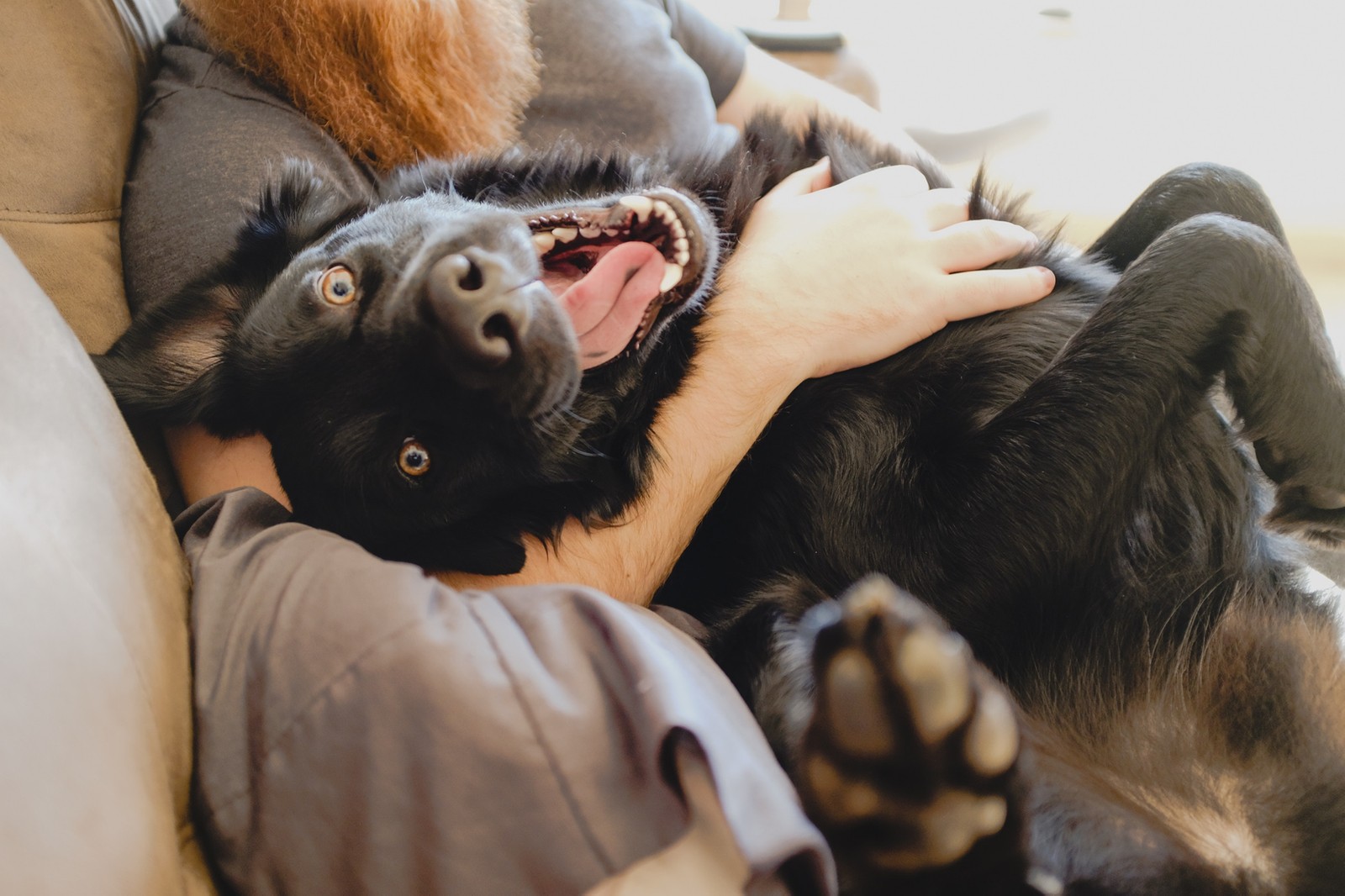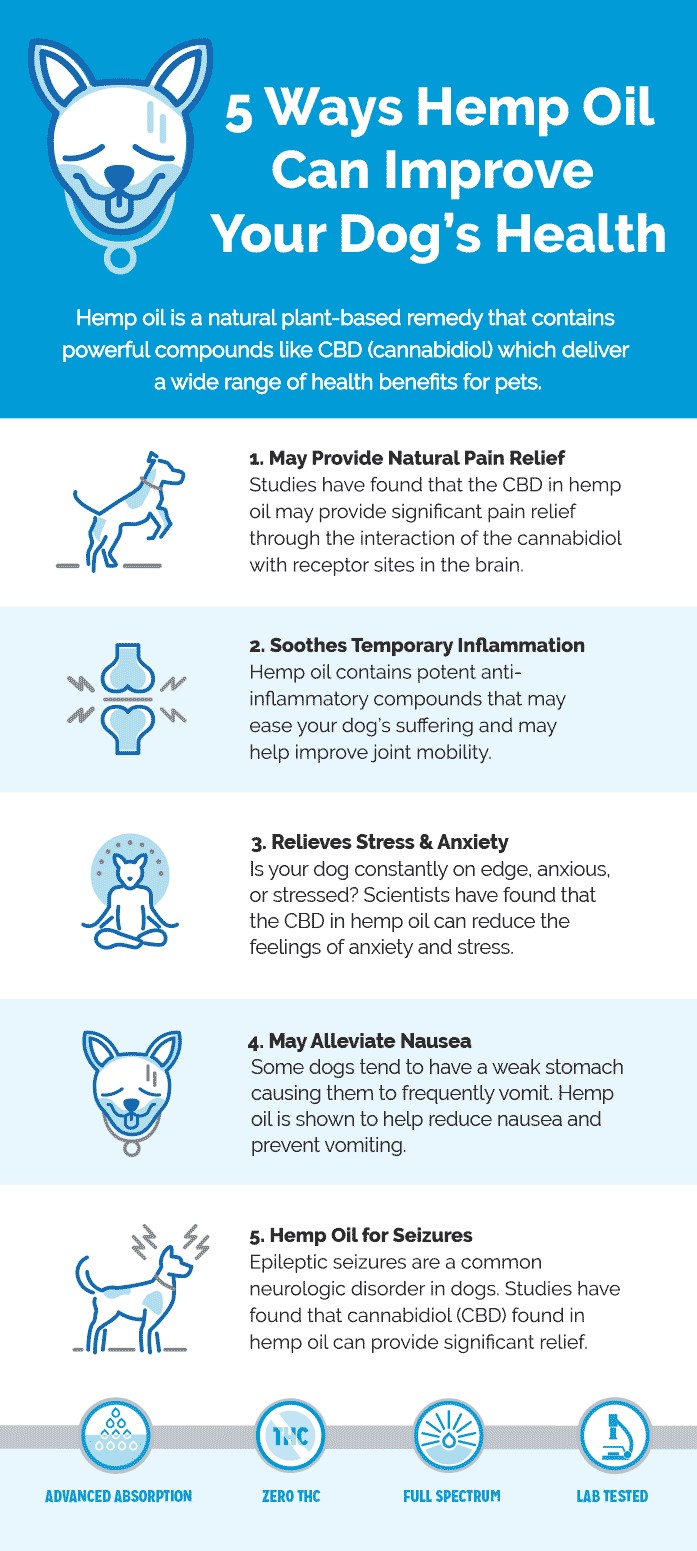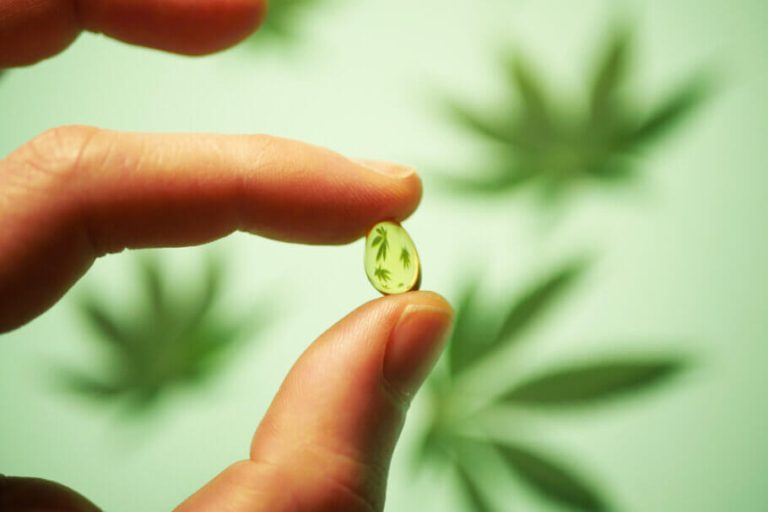CBD oil for dogs? If your ears just perked up, don’t be surprised. Dog lovers giving their puppies CBD is quickly becoming very popular. This phenomenon can be explained, in part, by the fact that something close to 74% of CBD users have pets. But is it safe? Does it work? In this article, we answer those questions. As well, we examine the science and studies so far; make a checklist of a few do’s and don’ts; provide a method for calculating dosage, give general guidelines for administering CBD for dogs; look at the pros and cons of various delivery methods such as CBD oil and treats; and offer a short buying guide. Enjoy!
Full Disclosure: Linked products in this article point to items for sale in our shop. Recommendations for products from trusted brands follow below the article. We hope you find them helpful!
Is CBD for dogs safe?
Pure CBD appears to be safe and well-tolerated by animals according to a 2017 World Health Organization report. Dog owners need to be aware that CBD is metabolized in the liver and can interact with other medications. If your dog is on other medications or has any kind of liver problems, talk to your veterinarian first before starting to administer CBD.
The other big thing pet owners need to be aware of is quality control. Because the CBD market isn’t well regulated yet, CBD products can contain ingredients that aren’t listed on their labels — including THC, which is known to be toxic to cats and dogs. Make sure you purchase from a brand you trust. Check their lab test results to make sure there is no THC in their product.
Finally, CBD is often sold as a tincture and the carrier oil is typically MCT oil. MCT oil is derived from coconut oil and while coconut oil is generally safe for dogs, some canines may be allergic to it. To read more about the benefits and possible risks of MCT oil for your dog read here.
How does CBD for dogs work?
CBD acts on the endocannabinoid system (ECS), a complex set of receptors throughout the body that regulates everything from stress, sleep, metabolism, memory, inflammation, immunity and more. Humans have endocannabinoid systems, as do all mammals, fish, birds, reptiles and amphibians.
Leading endocannabinoid scientist Bradley E. Alger, (PhD, Harvard) explains that “…Endocannabinoids are literally a bridge between body and mind,” which is why CBD works across such a vast number systems in our bodies. CBD interacts with various receptors like CB1 and CB2 to promote homeostasis—a state of balance in which all of the body’s systems are working most effectively.
Can CBD for dogs treat pain and other conditions?
That depends who you ask. The science on CBD’s effectiveness for dogs is still young, but there is a lot of anecdotal evidence out there. Search the web a bit and you’ll find a huge number of pet parents swearing by CBD’s value in relieving their pet’s health conditions. In general, pet owners are using CBD oil for dogs to treat the following:
- Joint pain and inflammation, especially in aging dogs
- Lack of appetite
- Separation anxiety
- Excessive barking
- Nausea from car rides
- Stressful car rides or trips to the vet or groomer
- Muscle spasms or seizures
- Aid in recovery from surgery or illness
- Pacing or inability to relax
- Fear of thunderstorms, fireworks or other loud noises
- Aggression toward other dogs
- Constant itching from allergies or other causes
An explosion in demand has resulted in a wave of innovation as new CBD products for dogs enter the market. In jurisdictions where CBD is legal like Canada, CBD products for dogs are getting more diverse, including treats and chews, shampoos, topicals and more.
According to American Kennel Club (AKC) Chief Veterinarian, Dr. Jerry Klein, CBD’s potential lies in its anti-inflammatory properties, cardiac benefits, anti-nausea effects, appetite stimulation, anti-anxiety impact and possible anti-cancer benefits—although there’s no conclusive data to support all that yet.
More research is coming. The AKC Canine Health Foundation (CHF) is now sponsoring a study through Colorado State University College of Veterinary Medicine and Biomedical Sciences that will evaluate the use of CBD in treatment-resistant epileptic dogs. The CHF hopes that this will be the first study to gain scientific data on the use of CBD in dogs with this condition.
In a 2018 study published in Frontiers in Veterinary Science, CBD oil increased comfort and activity in the home environment for dogs with osteoarthritis. In fact, 80 percent of the dogs in the study saw significant decrease in pain and improved mobility.
The following year a study showing CBD may help reduce the number of seizures experienced by epileptic dogs. But although these studies were well-designed and peer-reviewed, they’re still small and very preliminary.
More links to study results:
- Cornell University CBD and Dog Arthritis study: https://www.frontiersin.org/articles/10.3389/fvets.2018.00165/full
- Colorado State University release on the preliminary data from the (pilot) study looking at CBD as a treatment for Epilepsy in dogs: https://cvmbs.source.colostate.edu/preliminary-data-from-cbd-clinical-trials-promising/
- CBS News story on the CBD and Epilepsy (pilot) study done at Colorado State University: https://denver.cbslocal.com/2018/07/16/csu-cbd-oil-dogs/
 Compared to the studies, there’s far more information coming from dog owners themselves—suggesting it can treat pain, especially neuropathic pain, as well as helping to control seizures. Despite some scientific uncertainty at this early stage, word of mouth regarding CBD’s effectiveness has seen the use of CBD oil for dogs increase exponentially. Veterinary researchers hope the science can catch up soon.
Compared to the studies, there’s far more information coming from dog owners themselves—suggesting it can treat pain, especially neuropathic pain, as well as helping to control seizures. Despite some scientific uncertainty at this early stage, word of mouth regarding CBD’s effectiveness has seen the use of CBD oil for dogs increase exponentially. Veterinary researchers hope the science can catch up soon.
Colorado State University researcher Stephanie McGrath, who helped the American Kennel Club conduct their study, is optimistic about CBD. Veterinarians don’t have a broad choice of drugs to choose from to treat conditions like osteoarthritis and epilepsy. Some of those that exist often come with debilitating side effects, such as weight gain and lethargy. “If CBD works, then I think it would hit the mark of being both effective and not carrying a lot of side effects,” said McGrath. “So that’s kind of what we’re hoping for.”
McGrath and others are new conducting larger studies on CBD for treating osteoarthritis in dogs and cats, epilepsy in dogs and post-operative pain, but it will be a while before the results are published. If you’re thinking of treating your dog’s condition with CBD, talk to your vet first.
CBD for dogs, the do’s and don’ts
Do…
Talk to your vet! They may have good advice concerning what products to buy, give you an idea about proper dosage, and make sure CBD won’t interfere with any other medication your dog may be on. Just be sure to ask your vet if they are allowed to discuss CBD first.
Buy from a trusted source. Unfortunately, there are quite a few sub-standard products out there. While some contain little to no CBD, others can contain ingredients that aren’t listed on their labels — including THC, which is toxic to both cats and dogs. Check that they provide lab-tests and disclose all ingredients.
Check the ingredients on the label. Make sure products contain no allergens. Be careful with your personal CBD products as well. Dogs are curious. Upon finding your stash, they could be tempted to try CBD gummy candies themselves. The danger is, some of these may be sweetened with an artificial sweetener like Xylitol, which is toxic for animals.
Don’t….
Give dogs human CBD treats—they may be toxic to your pets! Human foods we shouldn’t share with our pets include:
Chocolate
Coffee
Nuts
Oils
Citrus
For a full list see here.
 What’s the proper dosage of CBD for my dog?
What’s the proper dosage of CBD for my dog?
While a veterinarian could advise you best, there are some general rules you can follow to administer healthy quantities of CBD to your pets:
- Mild Dose — 0.022 mg/lb or 0.05mg/kg
- Average Dose — 0.068 mg/lb or 0.15 mg/kg
- Strong Dose — 0.136 mg/lb or 0.30 mg/kg
The easiest way to accurately administer CBD is to use CBD oil given through a dropper (although dogs sometimes find it easier to lick the drops of CBD oil off a spoon). Calculate the CBD per drop in a given bottle using the formula below.
The average CBD oil bottle is 30ml and there are about 600 DROPS in a bottle. (Each 1ml contains 20 drops, FYI)
Divide the total amount of CBD in your bottle by the number of drops and you’ll have the amount of CBD per drop. For example:
250mg CBD ÷ 600 drops = 0.42mg per drop
If your cat or dog weighs 10 pounds, then a dose of “average” potency would be 0.68mg, or around 2 drops.
If you’re using CBD oil to treat chronic conditions, here are the generally recommended dosages:
- Arthritis: 0.5mg of CBD per kilogram of your pet’s weight (0.5 mg/kg) twice per day
- Pancreatitis: To start off, 0.1mg/kg twice daily; over time you can gradually increase it up to 0.5mg/kg twice daily
- Asthma: 0.5mg/kg twice daily
- Seizures: 0.5mg/kg twice daily and gradually increase. Veterinarians say it takes up to 3mg/kg for CBD to manage cats with seizures
- Chronic Upper Respiratory Infections: 5mg/kg twice daily
- Inflammatory Bowel Disease: 0.2mg/kg twice daily
 Can my dog overdose on CBD?
Can my dog overdose on CBD?
Humans and dogs tolerate large doses well. If your pooch gets too much CBD, you may notice that it makes them tired, but given a lower dose they may experience an energy/alertness boost. If you notice this side effect, there is little to nothing to worry about.
Some dog owners purposely give their pets high doses of CBD for insomnia. Common side effects such as nausea or diarrhea may happen, but they are fairly rare and mild. CBD is non-toxic and does not cause overdoses.
What’s better for dosage: CBD oil, treats, capsules, creams?
Veterinarian Stephanie McGrath’s analyzed how three different delivery methods — a capsule, an oil and a cream — affected the way CBD moved through the bodies of healthy dogs.
“We measured the pharmacokinetics, which basically means you give the dogs a single dose of all three delivery methods and then you measure a bunch of different blood levels over a 12-hour period,” says McGrath. “So how quickly is the CBD absorbed, how high the blood concentration gets at that single dose, and then how fast the CBD is eliminated.”
McGrath found that the oil had the best pharmacokinetic profile, meaning it reached the highest concentration in the blood, stayed in the bloodstream the longest, and performed the most consistently across the different dogs. The capsule also performed well but the cream less so.
CBD often comes in MCT oil, derived from coconut oil. While coconut oil is generally safe for dogs, some canines may have an allergic reaction to it. To read more about the benefits and possible risks of MCT oil for your dog read here.
CBD capsules typically provide relief of symptoms for 6-8 hours. In that time, you can administer more CBD if needed. Unlike an oil/tincture, capsules have to pass through the digestive system before it’s absorbed into the bloodstream so expect 30-60 minutes before you see CBD working.
CBD-infused pet treats are another fun way to administer a dose. When buying treats be aware that they will have to pass through the digestive tract before the body can absorb them, so expect it to begin working within 30-60 minutes.
Dog owners should “start low and go slow” when figuring out a dosage. She also suggests that using tinctures rather than a chew treat can make it easier to scale dosages up or down. Some brands of treats label the mg/treat on their packaging. Convenient!
CBD for dogs: Buying guide
Once you decide try CBD for your dog, you’ll want to keep a few things to keep in mind when purchasing.
- Look for organic. If the CBD oil is not organic, it at least should not contain pesticides, fungicides, or solvents.
- Don’t price shop. The higher the quality and purity, the higher the cost. You don’t want to go for a cheaper option that could have toxic substances such as pesticides, herbicides, or heavy metals. Make sure your CBD oil is free of additives.
- Get the analysis. The manufacturer should provide a certificate that tells you the amount of CBD that is in the product. Many CBD products contain only small amounts of CBD. You’ll also want to make sure there is little or no THC in the product.
- Buy CBD as a liquid. You can buy pet treats containing CBD, but the best form to administer is an oil or tincture. This way, you can adjust your pet’s dose drop by drop. Make it tasty for them, get them a bacon flavored CBD oil!
Learn more about CBD

CBD and Stress: How Cannabinoids Help You Stay Calm in a Busy World
If it feels like life keeps getting louder and faster, you’re not alone.Between deadlines, notifications, and never-ending to-do lists, most of us are
read more
CBD Smoothie Recipes You’ll Actually Love
🥤 Simple, delicious ways to enjoy your daily CBD oil. Why Add CBD Oil to Your Smoothie? Smoothies are already a great way to
read more
A Calm Routine: How to Use CBD Skincare from Morning to Night
If your skincare shelf is starting to look more like a science lab, you’re not alone. These days, there’s a serum or cream
read more
From Mouse to Marathon: Can CBD Support Endurance Through the Gut?
Gut health has become a growing focus in the wellness world, and for good reason. The gut microbiome affects digestion, immunity, and even
read more
Microdosing CBD: Why Less is More
Many assume that more CBD means better results, but that’s not always true. Instead, taking smaller doses more frequently may be a smarter
read more
Sleep Naturally: How CBD, CBG, and CBN Can Enhance Your Rest
Quality sleep is essential, yet modern lifestyles often leave us restless. With rising stress levels and digital distractions, many are turning to natural
read more

